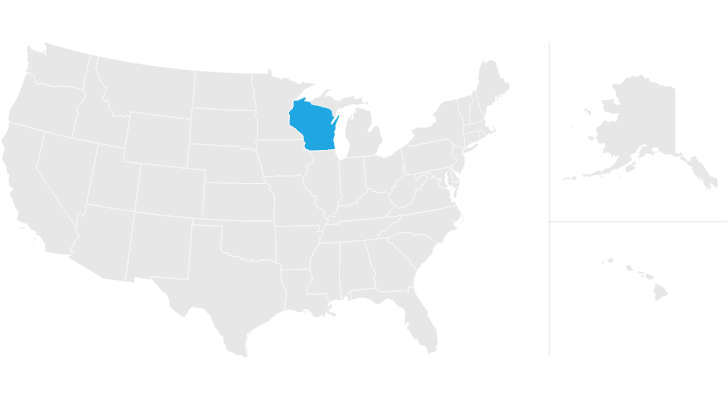In Wisconsin, setting up a living trust involves several key steps, including selecting a trustee, transferring assets into the trust, and clearly outlining your wishes for asset distribution. Understanding the nuances of Wisconsin state laws regarding living trusts is crucial, as they can impact how your trust is managed and executed. Whether you’re looking to protect your estate, provide for loved ones or simply ensure your wishes are honored, creating a living trust can be an invaluable tool in your estate planning arsenal.
A financial advisor can help you create an estate plan for your family’s needs and goals.
Creating a Living Trust in Wisconsin
In Wisconsin, creating a living trust can be a strategic move for estate planning, offering benefits such as avoiding probate, maintaining privacy and potentially reducing estate taxes. Here are six steps to create a living trust in the Badger State:
- Figure out which type of trust you need: If you’re a single person, a single trust is probably the best choice. If you’re married, you might be better served by a joint trust. Both you and your spouse will be able to put your property into a joint trust, plus it can be used to store jointly owned property, like cars or homes.
- Take stock of your assets: Know exactly what you own and what you want to store in your trust. Much of what you own can go in the trust, including stocks and bonds. Also, take the time now to gather relevant property documents, like car titles and home deeds.
- Decide who your trustee will be: This is the person who will manage the trust assets and transfer the trust property to your beneficiaries after you’ve died. You can pick yourself as trustee for now, but you’ll need a successor trustee who will take over when you die or if you become incapacitated. Also, take this time to decide what you want to pass on to which heirs.
- Draw up the trust document: You can use an online program to do it yourself or get the help of an attorney.
- Get the trust document notarized: Sign the trust document before a notary public.
- Put your property into the trust: You can also do this yourself, but it does take some paperwork, so a lawyer may be helpful.
What Is a Living Trust?
A living trust is a legal framework into which property and assets can be placed. It is established by a document, and it has a trustee who is in charge of managing the trust property and distributing it to the proper beneficiaries. You can make yourself the trustee or pick someone else.
One type of living trust is an irrevocable living trust, which is permanent and cannot be easily modified. Property can’t be taken out of it without first getting permission from everyone named in the trust. The trust wholly owns the property placed in it, and taxes are paid on the trust’s property through the trust.
A revocable living trust, by contrast, offers some flexibility. It can be modified at will and property can be taken out at the discretion of the person who created the trust, also known as the grantor. The grantor maintains ownership of any property stored in the trust and pays taxes on it as usual.
How Much Does It Cost to Create a Living Trust in Wisconsin?
The amount you’ll spend to create a living trust depends on the method you use. The first option is to write the document yourself, likely using an online program. This option will likely cost a few hundred dollars or so. The other option is to hire an attorney, which will probably cost more than $1,000.
It is cheaper to write the document yourself, but there are some dangers to DIY estate planning. There are a lot of details and moving parts involved that you’ll have to be aware of. This requires significant time and research. If you’re not confident in your abilities, hiring an attorney may be a preferable solution. Just make sure you find a lawyer who is a trust specialist, not just an estate planner, and that you know the attorney’s fees upfront so there are no surprises.
Why Get a Living Trust in Wisconsin?

The most common reason you’d get a living trust in Wisconsin is to avoid going to probate court. Probate is a process that most estates must go through to establish the validity of a will. It can take a lot of time and be an invasion of privacy. Wisconsin has not adopted the Uniform Probate Code, which in some states greatly simplifies the probate process. For this reason, a living trust may be especially useful in Wisconsin.
A living trust can also make it easier to specify when you’ll leave property to a minor child, as the property can stay in the trust under the stewardship of the trustee until the child reaches legal age. Also, if you have a living trust and become incapacitated, the presence of a trustee makes conservatorship unnecessary.
Who Should Get a Living Trust in Wisconsin?
Many people think that living trusts are just for the wealthy. But because Wisconsin has not adopted the Uniform Probate Code, even smaller estates may benefit from using a living trust in the Badger State. That said, estates in Wisconsin that are worth less than $50,000 undergo a simplified probate process, so a living trust may not be worthwhile for those estates.
A living trust does cost more and take more time to set up than simply writing a will. It also could cause more complications after you die, as it provides a longer window of time for legal challenges. Be sure to take these downsides into account when deciding whether or not you should get a living trust. If you decide against a living trust, remember that you’ll still need an estate plan.
Living Trusts vs. Wills
Both trusts and wills are essential tools in estate planning, but they serve different purposes and offer distinct advantages. A will is a legal document that outlines how you want your assets distributed after your death. In contrast, a living trust is a legal arrangement where a trustee holds and manages your assets for the benefit of your beneficiaries, both during your lifetime and after your death.
Even if you create a living trust, you’ll still need a will to direct any property that’s not placed in the trust. Additionally, a will is capable of the following items that a living trust is not:
- Designating an executor
- Providing instructions on how to pay taxes and debts
- Naming managers for children’s property
- Establishing guardianship for children who are minors
Here is a more in-depth comparison of the abilities of living trusts vs. wills:
Living Trusts vs. Wills
| Purpose | Living Trusts | Wills |
| Name guardians for children | Yes | Yes |
| Allows revisions to be made | Depends on type | Yes |
| Avoids probate court | Yes | No |
| Requires a notary | Yes | No |
| Name an executor | No | Yes |
| Names an executor | No | Yes |
| Requires witnesses | No | Yes |
Living Trusts and Taxes in Wisconsin

A living trust likely will not impact your taxes, but it can’t hurt to know about the Wisconsin estate tax and the Wisconsin inheritance tax as you plan your estate.
There is no estate tax or inheritance tax in Wisconsin. The federal estate tax may come into play, but it only applies to estates that are worth at least $13.99 million, or $27.98 million for couples.
Bottom Line
For Wisconsin residents, making a living trust requires some work, but it may be worth it. The state has not adopted the Uniform Probate Code, so having a living trust could be very useful for your heirs after you’ve died, as it will allow them to avoid a potentially lengthy and costly probate process. You can create your living trust yourself, but, like any estate planning activity, it can get tricky. Finding a lawyer may be the most responsible course of action.
Estate Planning Tips
- Estate planning isn’t easy but a financial advisor can help you work through all the details to set up a living trust. Finding a financial advisor doesn’t have to be hard. SmartAsset’s free tool matches you with vetted financial advisors who serve your area, and you can have a free introductory call with your advisor matches to decide which one you feel is right for you. If you’re ready to find an advisor who can help you achieve your financial goals, get started now.
- A 401(k) plan can’t go directly into your living trust, but you can name the living trust as a beneficiary. If you do this, your benefits will be paid directly into your trust after you die.
Photo credit: ©iStock.com/PeopleImages, SmartAsset.com, ©iStock.com/LPETTET
